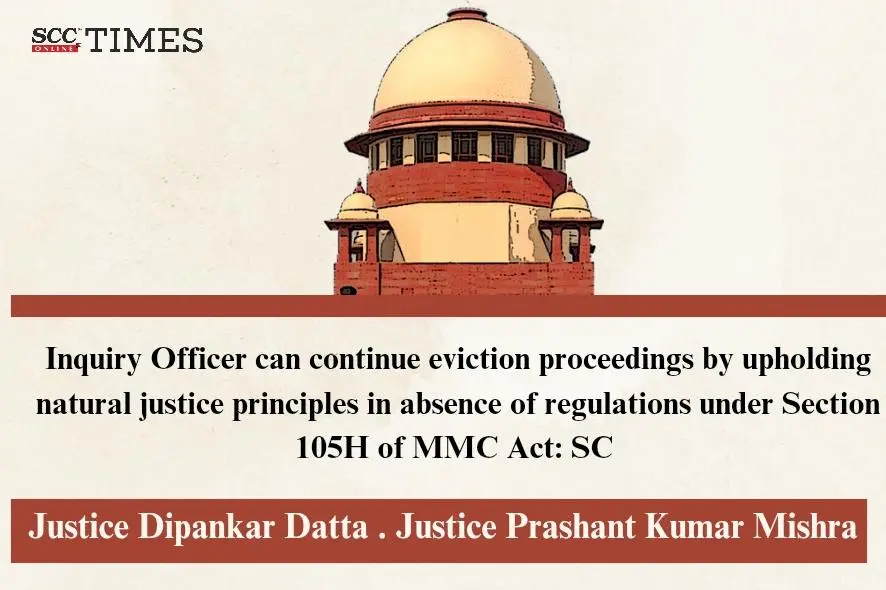Supreme Court: In a batch of civil appeals challenging a judgment of the Bombay High Court, wherein while expediting the proceedings for eviction pending before the Inquiry Officer under the Mumbai Municipal Corporation Act, 1888 (‘the Act’) against the respondents, framed points for the Inquiry Officer to determine the matter and laid down the procedure, the Division Bench of Dipankar Datta* and Prashant Kumar Mishra, JJ. held that the impugned order before the High Court were not maintainable in the form, they were presented and did not warrant the High Court to exercise jurisdiction by framing points for determination by the Inquiry Officer.
Hence, allowing the appeal, the Court set aside the impugned decision. The Inquiry Officer was directed to allow both parties to lead evidence and raise whatever points are available in defence, except to the extent determined by judicial orders previously. Such an officer would proceed to independently notice contentions and issues arising for his decision on the basis of evidence led and the defence raised by the respondents and decide the claims in consonance with principles of natural justice.
Background
The appellants were aggrieved by the framed points for determination by the Inquiry Officer. According to the appellants, proceedings for eviction of unauthorised occupants of public premises are summary in nature where, upon a show cause notice being issued, the noticee is required to place his defence which the Inquiry Officer, as the delegate of the Municipal Commissioner, is required to consider, reasonably, and proceed to determine, in accordance with fair procedure, as to whether the noticee is indeed an unauthorised occupant. Also, the Inquiry Officer is under obligation to bear in mind the provisions in Chapter V-A of the Act titled ‘Power to Evict Persons from Corporation Premises’, which is a code in itself. However, in the impugned decision, points were framed for determination and has, in effect, laid down a procedure which is not only contrary to the provisions of Chapter V-A of the Act but in the process has nullified binding decisions of the High Court and this Court and thrown legal principles, by acting entirely in excess of jurisdiction.
Factual Matrix
The respondents are occupants and/or legal heirs of the original occupants who were allotted the subject premises on leave and license basis in the 1960s, owing to their employment with the appellants. In 2007, eviction proceedings were initiated against the respondents under the Act. The respondents approached the High Court, seeking to convert their tenancy to permanent ownership on the basis of a resolution which had allegedly been passed by the Municipal Commissioner, which came to be struck down by holding that the land belonged to the people and could not be the subject of State largesse, especially when the terms of the respective allotments categorically stated that the license would terminate upon the occupant’s retirement from municipal service. This Court also dismissed the challenge to the High Court’s order refusing to nullify the eviction proceedings, thus, stamping its approval on initiation and continuation of such proceedings. Notices were issued to the respondents to vacate the premises which triggered the second round of litigation by the respondents. The eviction notice was challenged on the ground of breach of principles of natural justice. The High Court allowed the challenge with a direction to the Inquiry Officer to decide the eviction proceedings de novo.
The High Court, in the impugned judgment, decided the issue in favour of the appellants herein by holding that mere lack of regulations could not be valid grounds for keeping the proceedings in abeyance. It was further held that though the Inquiry Officer was an employee of the first appellant, he was acting in a quasi-judicial capacity under Section 68 of the Act in an independent manner and was thus duly authorized to conduct the inquiry proceedings and pass appropriate orders on the basis of evidence adduced. However, the High Court, in an apparent volte face which is unexplainable, proceeded to frame the nine points for determination with respect to the pending inquiry proceedings.
Analysis and Decision
Regarding the respondents’ petition for quashing the decision of the Civil Court, the Court held that the same was not maintainable and ought to have been dismissed at the threshold with respect to its primary relief.
The Court noted that the petition of the respondents was also filed under Article 227. The Court reiterated that the provision bestows the High Courts with powers of administrative and judicial superintendence over subordinate Courts.
Regarding the grounds of violation of principle of natural justice, raised in the writ petition, the Court said that respondents’ submission was not that they were not given an opportunity of being heard by the Civil Court. The Court said that such an opportunity was given, even if the conclusion arrived at by the Civil Court was erroneous, and it could not be remedied by the High Court in exercise of its powers under Article 227 of the Constitution. The Court reiterated that a mere wrong decision is not enough to attract the jurisdiction of the High Court under Article 227. Thus, the Court held that a petition of the respondents also failed to merit the exercise of the High Court’s supervisory powers and should have been rejected in view of the same.
Further, the Court added that it is well settled that decisions rendered by administrative authorities can be interfered with by High Courts in exercise of Article 226 powers, however, sparingly. In the matter at hand, the Court said that once the appellate order of the Appellate Officer came into existence, the order of the Inquiry Officer merged in the former and had no independent existence. Perusing the order of the Inquiry Officer the Court found the same to be reasoned order, supported by judicial decisions, answering distinctly each and every contention raised by the noticees. Hence, the Court held that the High Court exceeded the ambit of both, its writ and supervisory, jurisdiction insofar as it proceeded to frame points for determination in a summary proceeding, more so when the proceedings were at the embryonic stage of notice having been issued to the respondents. The Court stated that having directed that the proceedings be conducted in consonance with the principles of natural justice, the High Court overstepped its limits and took unto itself a duty which the Act entrusts the statutory authority to exercise. The High Court could, at best, have moulded relief as deemed fit and proper, but in framing issues for the Inquiry Officer to determine, the High Court went far beyond its domain by substituting its own wisdom for that of the civil court.
The Court clarified that if the officers have no personal interest in the lis, bias cannot be imputed; especially since the officer is acting not in his capacity as an executive official, but as a quasijudicial authority. The Court held that even in the absence of regulations being framed under Section 105H of the Act, the proceedings for eviction can be continued by the Inquiry Officer by adhering to principles of natural justice. The Court added that the said provision cannot be construed as placing an embargo on the Inquiry Officer to proceed until regulations were framed.
CASE DETAILS
|
Citation: Appellants : Respondents : |
Advocates who appeared in this case For Petitioner(s): For Respondent(s): |
CORAM :









